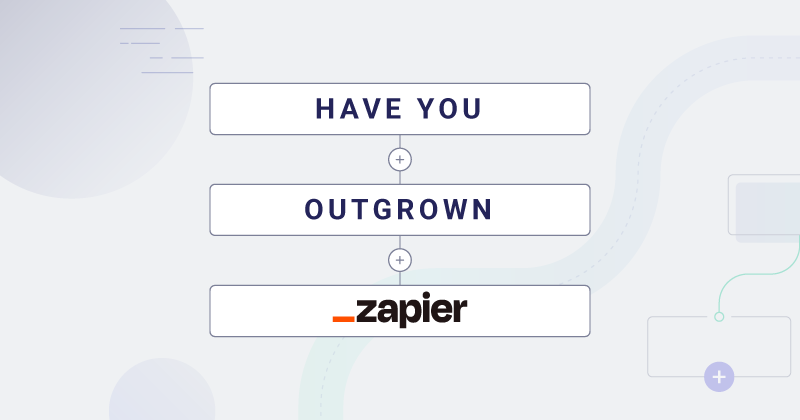Prismatic leads in satisfaction for embedded iPaaS!
Fits the way you build software
Give your team the integration tools that fit the way they work using our low-code builder or their favorite IDE. The choice is theirs.
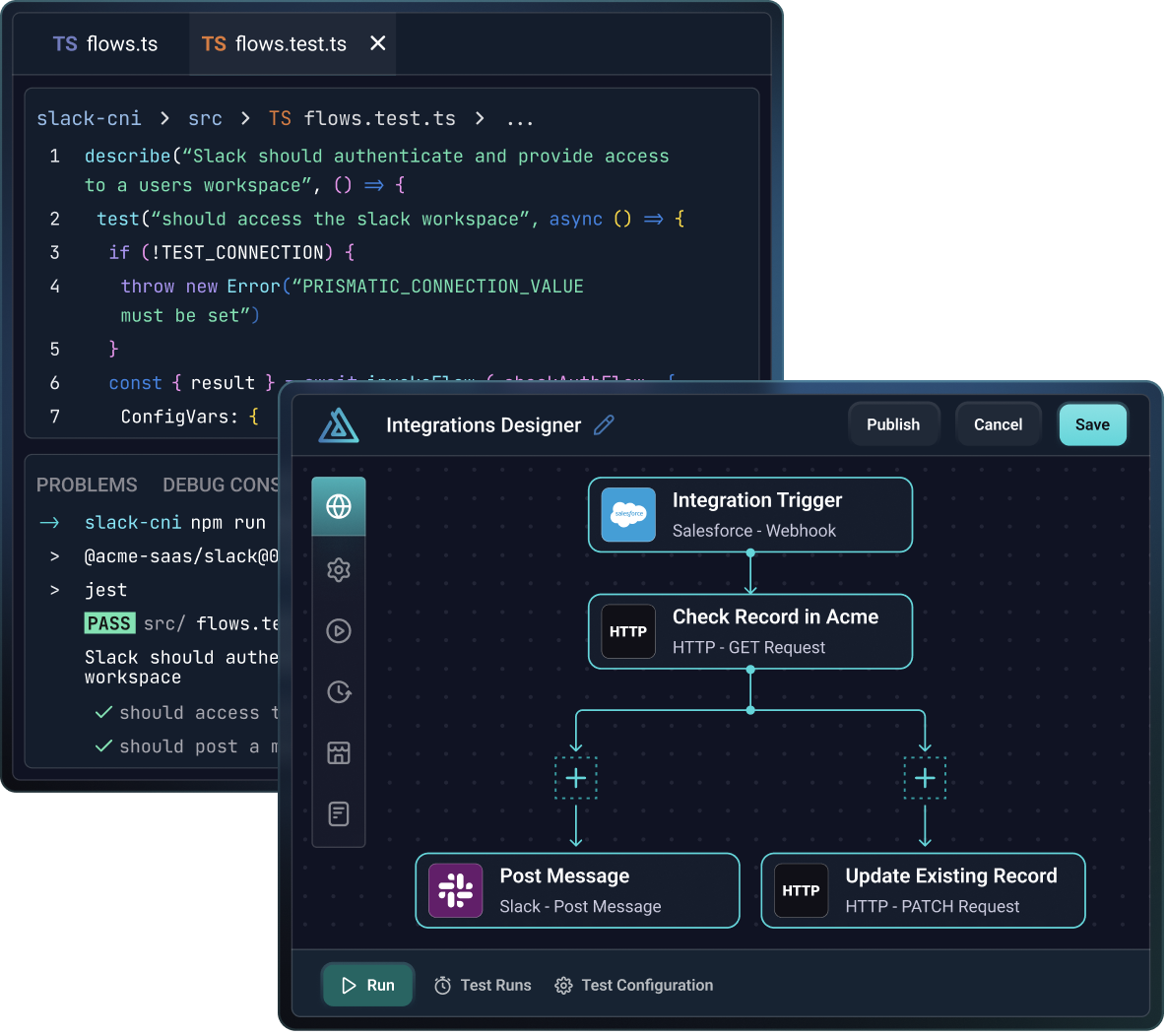
Write integrations in code
Your devs may wonder why they should use a low-code builder when they can write it themselves. We get it.
Our code-native SDK gives you the power to write integrations in code using your favorite IDE. Happy coding!
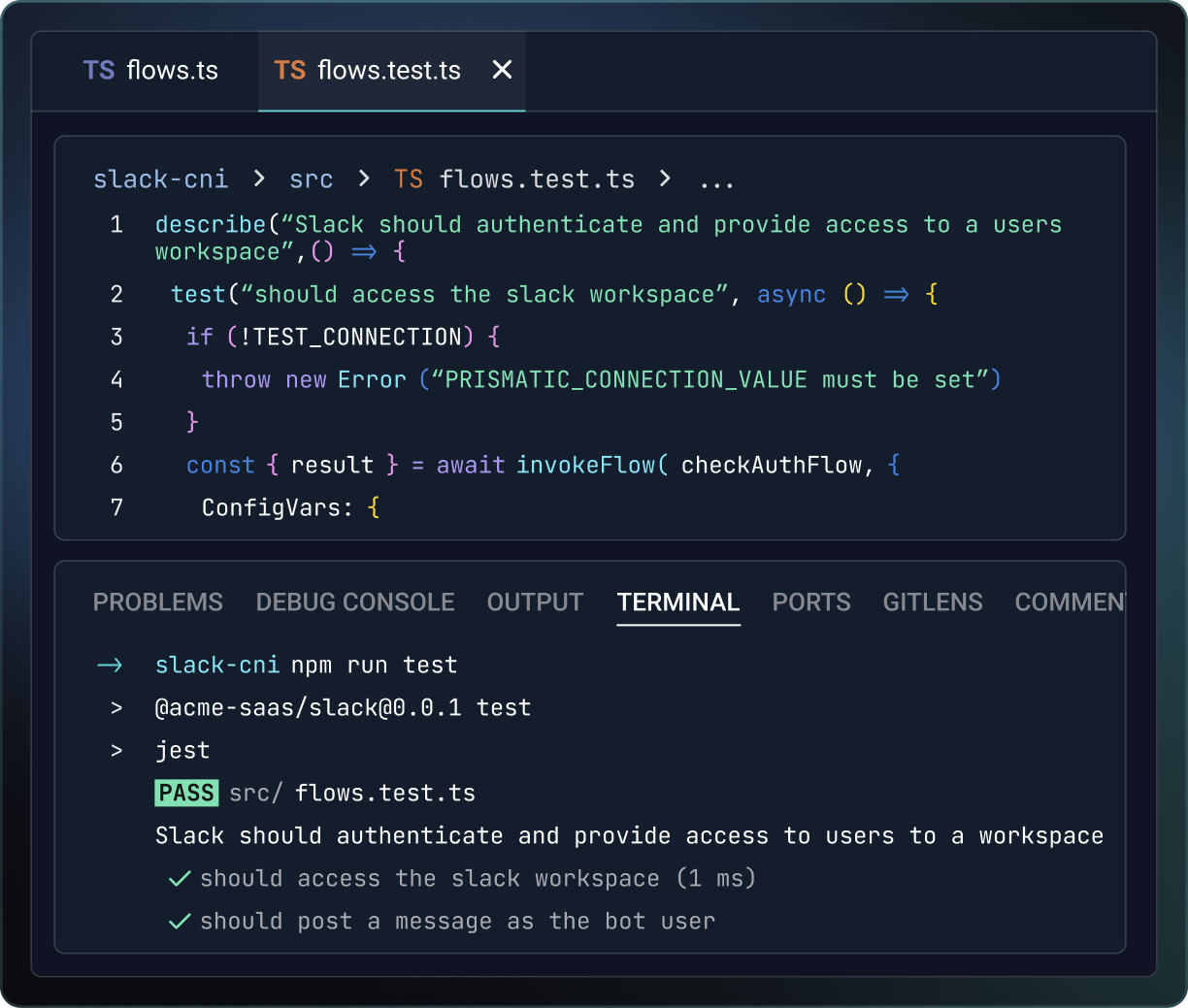
Build integrations in low-code
Your non-devs may prefer working in a low-code environment. Our intuitive drag-and-drop low-code builder allows teams to build simple integrations fast and handle complexity with ease.
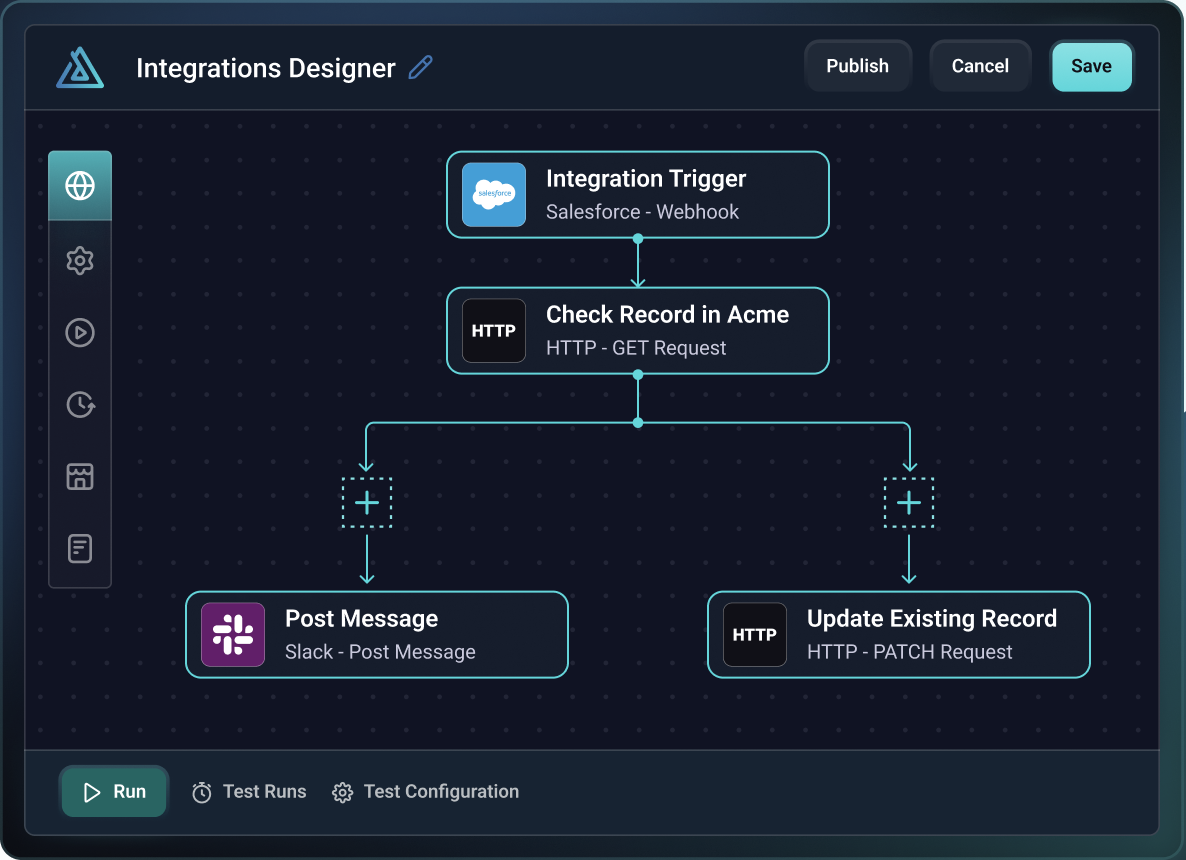
Test, demo, iterate
Our integration platform has all the tools you need to test, demo, and iterate on integrations to ensure requirements are met before those integrations are deployed to customers.
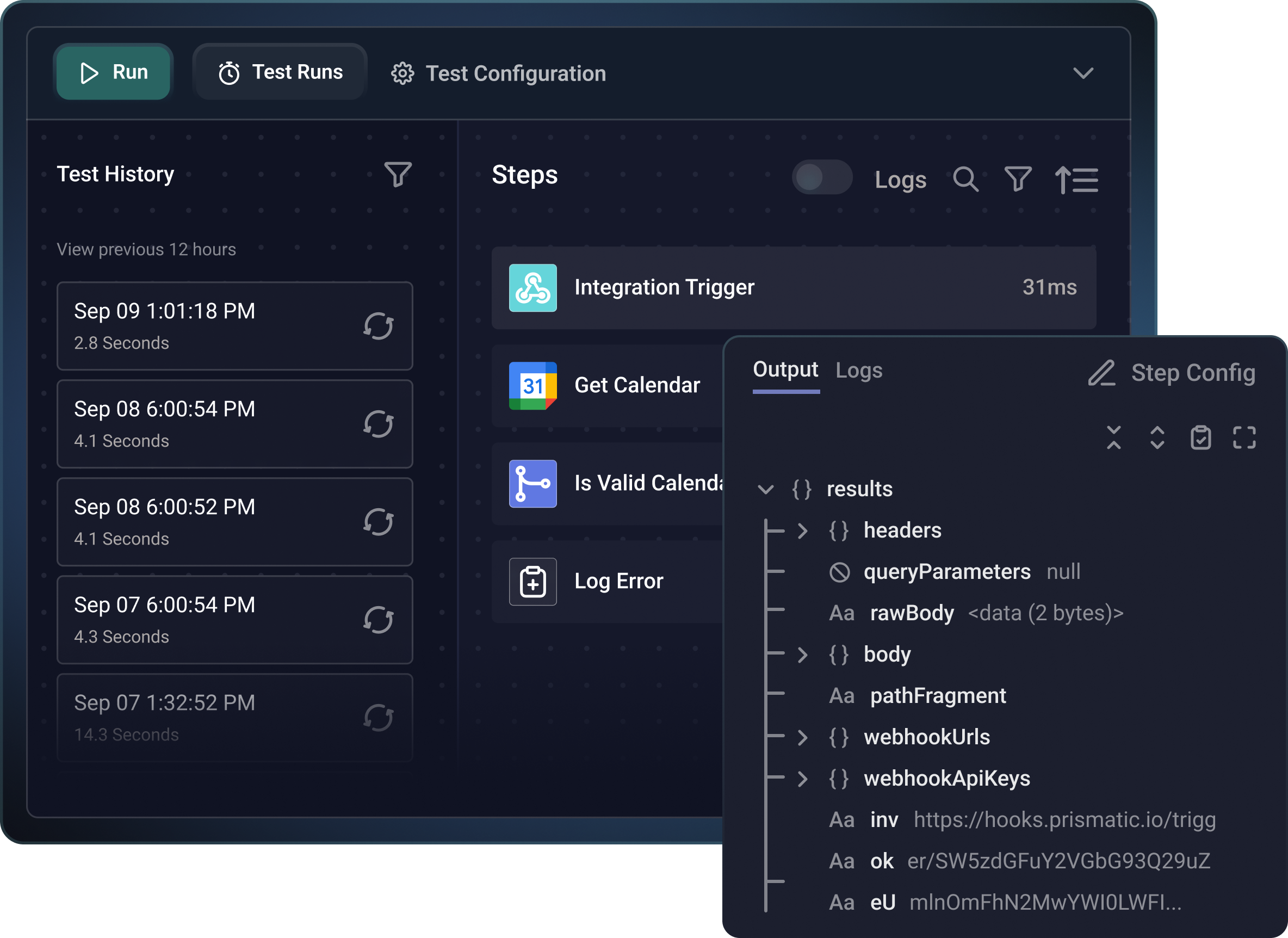
Automate your integration publishing process
Finding a tool that fits your SDLC is crucial. With Prismatic, you can promote integration or component code from dev tenants to production. We’ve also combined our Prism CLI with GitHub Actions to perform standard version control functions.
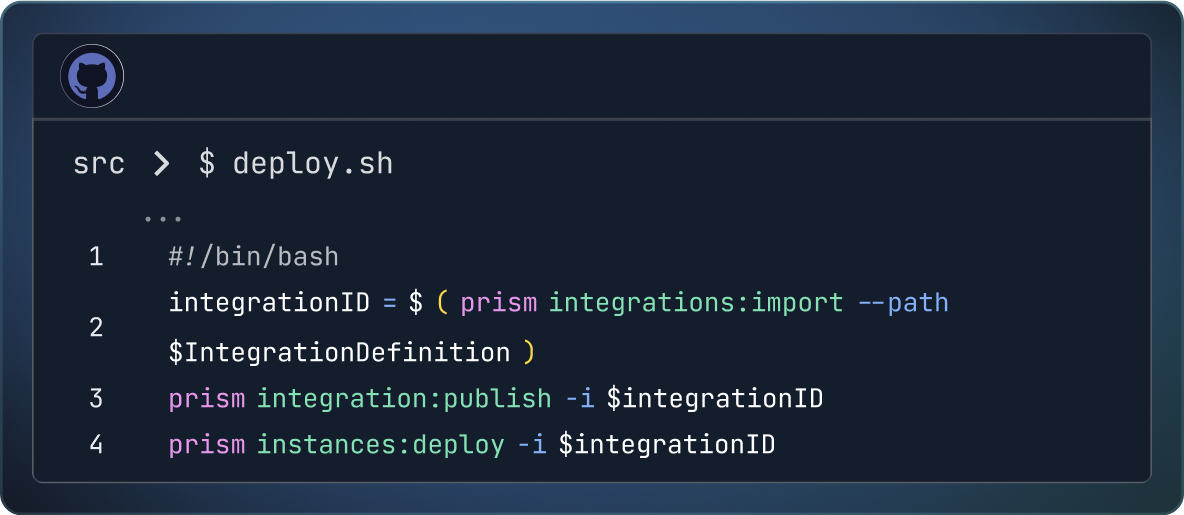
Prismatic beautifully supports the model we wanted: technical support staff configure new instances of known integrations; software engineers get involved when there's something new; support staff can monitor what's happening day-to-day. Meanwhile, we can focus engineering cycles on adding value for our customers.

With Prismatic, we're able to deliver integrations in far less time while streamlining our engineering effort. Prismatic has given us the ability to more widely build integrations across our teams. It has also allowed our customer-facing teams to handle customer-specific deployment.


Prismatic has been a game-changer for our team. The platform's intuitive low-code builder, marketplace and robust monitoring capabilities allow us to deliver complex integrations faster and more reliably than ever before. Whether quickly wiring up an integration using pre-built components or developing custom logic, Prismatic gives us the flexibility we need.


We probably save 95% of engineering time, we've deployed far more integrations than we would have without Prismatic. Everyone gets it; everyone understands that we can integrate wherever we need to, and that's quite a powerful thing.


The speed to market, the development costs, the ease of usability, the variety of integrations, the ability to customize it, and then also make a seamless marketplace. It's the whole package. Prismatic has changed the game, certainly 100% for us.


We've been able to see a roughly 50% increase in new customer acquisition simply by that factor of reducing time on our maintenance. My development team can now focus on new integrations and new automations.


After evaluating numerous embedded iPaaS vendors, Prismatic emerged as the clear leader for scaling customer integrations. Their comprehensive toolset not only enables access to diverse data sources but empowers our customers to build, deploy, and manage their own integrations with confidence.


Prismatic has enabled FMX to be efficient, consistent, and reliable in our integrations with third party systems. Prismatic has quickly become the clear choice for all facets of our integration strategy, including the migration of current integrations from previous solutions. We are pleased to mention our partnership with Prismatic when discussing system integration with prospects, customers, and other solution providers.

Prismatic beautifully supports the model we wanted: technical support staff configure new instances of known integrations; software engineers get involved when there's something new; support staff can monitor what's happening day-to-day. Meanwhile, we can focus engineering cycles on adding value for our customers.

With Prismatic, we're able to deliver integrations in far less time while streamlining our engineering effort. Prismatic has given us the ability to more widely build integrations across our teams. It has also allowed our customer-facing teams to handle customer-specific deployment.


Prismatic has been a game-changer for our team. The platform's intuitive low-code builder, marketplace and robust monitoring capabilities allow us to deliver complex integrations faster and more reliably than ever before. Whether quickly wiring up an integration using pre-built components or developing custom logic, Prismatic gives us the flexibility we need.


We probably save 95% of engineering time, we've deployed far more integrations than we would have without Prismatic. Everyone gets it; everyone understands that we can integrate wherever we need to, and that's quite a powerful thing.


The speed to market, the development costs, the ease of usability, the variety of integrations, the ability to customize it, and then also make a seamless marketplace. It's the whole package. Prismatic has changed the game, certainly 100% for us.


We've been able to see a roughly 50% increase in new customer acquisition simply by that factor of reducing time on our maintenance. My development team can now focus on new integrations and new automations.


After evaluating numerous embedded iPaaS vendors, Prismatic emerged as the clear leader for scaling customer integrations. Their comprehensive toolset not only enables access to diverse data sources but empowers our customers to build, deploy, and manage their own integrations with confidence.


Prismatic has enabled FMX to be efficient, consistent, and reliable in our integrations with third party systems. Prismatic has quickly become the clear choice for all facets of our integration strategy, including the migration of current integrations from previous solutions. We are pleased to mention our partnership with Prismatic when discussing system integration with prospects, customers, and other solution providers.

Prismatic beautifully supports the model we wanted: technical support staff configure new instances of known integrations; software engineers get involved when there's something new; support staff can monitor what's happening day-to-day. Meanwhile, we can focus engineering cycles on adding value for our customers.

With Prismatic, we're able to deliver integrations in far less time while streamlining our engineering effort. Prismatic has given us the ability to more widely build integrations across our teams. It has also allowed our customer-facing teams to handle customer-specific deployment.


Prismatic has been a game-changer for our team. The platform's intuitive low-code builder, marketplace and robust monitoring capabilities allow us to deliver complex integrations faster and more reliably than ever before. Whether quickly wiring up an integration using pre-built components or developing custom logic, Prismatic gives us the flexibility we need.


We probably save 95% of engineering time, we've deployed far more integrations than we would have without Prismatic. Everyone gets it; everyone understands that we can integrate wherever we need to, and that's quite a powerful thing.


The speed to market, the development costs, the ease of usability, the variety of integrations, the ability to customize it, and then also make a seamless marketplace. It's the whole package. Prismatic has changed the game, certainly 100% for us.


We've been able to see a roughly 50% increase in new customer acquisition simply by that factor of reducing time on our maintenance. My development team can now focus on new integrations and new automations.


After evaluating numerous embedded iPaaS vendors, Prismatic emerged as the clear leader for scaling customer integrations. Their comprehensive toolset not only enables access to diverse data sources but empowers our customers to build, deploy, and manage their own integrations with confidence.


Prismatic has enabled FMX to be efficient, consistent, and reliable in our integrations with third party systems. Prismatic has quickly become the clear choice for all facets of our integration strategy, including the migration of current integrations from previous solutions. We are pleased to mention our partnership with Prismatic when discussing system integration with prospects, customers, and other solution providers.

Ready to get started?
Get a demo to see how Prismatic can help you deliver integrations fast.
